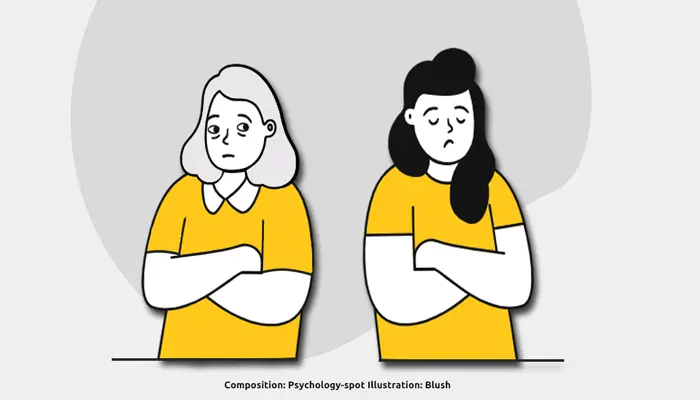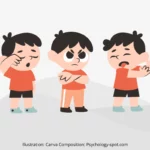
Controlling parents supervise their children’s activities and keep their lives under strict control. They want to know what their children are doing at all times and influence their decisions or even make them for them because, at the end of the day, they believe they know what is best for their children.
The problem is that this parenting style does not end in childhood or adolescence, but extends into adulthood. Controlling parents of adult children intend to continue imposing their ideas, ways of doing things and decisions, crossing many red lines to interfere in the lives of their children.
7 signs that reveal controlling parents
1. They assume the responsibilities of their children. Parents must protect their children, but not assume their responsibilities, even when they are young. However, controlling parents in adulthood will want to take on the responsibilities of their adult children, whether it be their finances or their relationships.
2. They interfere in everything. The duty of parents is to educate their children so that they can make their own decisions. However, controlling parents will want to continue making decisions for their children, from academic and work to social or even love; so they continually invade a space that should be personal.
3. They demand obedience. Controlling parents will continue to demand complete obedience from their adult children. They will establish rigid rules that restrict independence but that children must follow without question. They are likely to often remind their children that they have an “obligation” to them since they have had to “sacrifice” a lot to raise them.
4. They don’t respect privacy. Controlling parents in adulthood expect them to keep telling them absolutely everything. They do not respect the right to privacy of their children and are angry if they do not want to share some aspects of their lives.
5. Condition their love. The bargaining chip of controlling parents is usually love. They used it when their children were young and continue to use it with their adult children. When their expectations are not met or they do not follow their rules, they withdraw their love and affection, showing indifference until the child gets back on track.
6. They generate guilt. Controlling parents in adulthood often resort to emotional manipulation techniques in order to exercise dominance. It is not unusual for them to play the blame or shame card to control their children. Statements such as “A good son would not treat his parents that way” or “You will regret it when I die” are examples of covert control attempts.
7. They criticize everything. Controlling parents also use criticism as a weapon. They always have an opinion, even if they are not asked for it, and they often criticize the decisions their children make, especially when they have not been counted on or do not align with their expectations.
Controlling parents: Consequences for their sons
Basically, controlling parents stunt their sons’ ability to become autonomous, independent and confident people, capable of making their own decisions and assuming their responsibilities. In many cases, these are people with low self-esteem, highly dependent on social approval and external emotional validation. This tendency usually leads them to establish dependency relationships in which they are more vulnerable to being manipulated, so that in the long run they may suffer more.
In other cases, this excessive control generates the opposite effect: a fierce struggle for independence. This battle for autonomy tends to deteriorate parent-child relationships, but it also ends up affecting children, who can become fiercely independent as a defense mechanism and be reluctant to establish mature relationships by building an emotional wall that distances them from others. The result is the same: they suffer because they are unable to maintain satisfactory emotional relationships.
The dilemma and fear of controlling parents
The vast majority of controlling parents in adulthood want to protect themselves against loneliness. Having power over their children gives them the feeling that they continue to be useful and indispensable to them, in a way that minimizes the chances that the children will withdraw or “abandon” them.
Deep down, that need for control is fueled by the fear that their adult children will continue their lives successfully away from the family home. Therefore, when children try to take control of their lives and decide on their own, controlling parents assume it as an offense or disrespect, experiencing anger, rage and uneasiness.
In reality, controlling parents perceive the independence of their adult children as a threat. The idea that their role as father or mother could be taken away from them generates a feeling of emptiness or lack that makes them react by displaying all their arsenal of control techniques. They then practice different manipulative tactics, unaware of the harm and suffering that their behavior causes.
The problem is that often the relationship they establish ends up being suffocating and they get the opposite result: the children run away from the family home and cut the relationship.
How to deal with controlling parents?
Dealing with controlling parents is incredibly difficult. They are your family and they have raised you, so it is understandable that they have a huge emotional influence on you. So the first step is to acknowledge that there is a problem. It’s about understanding that your parents have unrealistic expectations about you and treat you like a small child, not an autonomous, self-reliant adult.
The second step is to set limits. A healthy relationship between parents and adult children must have clear boundaries. Healthy boundaries bring transparency to the relationship as each person knows what to expect from the other. They help undo dependencies, erase unrealistic expectations, and ease conflicts. Therefore, let your parents know what is bothering you and the red lines that they should not cross.
Maybe your parents haven’t realized the damage their controlling behavior is doing to you. Explain the problems it causes you, but without falling into recriminations. Let them know that you love them unconditionally, but that you also need space to make your decisions and make your life.
Finally, the third step in dealing with controlling parents is to explain the consequences of going beyond the limits you have set. Your parents must understand the value you place on your freedom and independence and, above all, what you are willing to do to protect them, whether it is to lock up a certain area of your life or establish a distance that protects your emotional balance. The road will not be easy, but the results are worth it.



